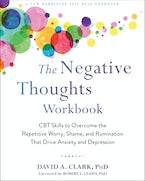By David A. Clark, PhD, author of The Negative Thoughts Workbook
Life affords us many opportunities to fall into a pit of despair from which it can be hard to climb out. To compound matters, the pervasive effects of the global pandemic are a daily reminder of life’s uncertainties. For most people, this “new normal” has created additional burdens that elevate our susceptibility to emotional distress. Persistent feelings of anxiety, despair, guilt, shame, humiliation, and resentment are emotions that can rob us of a higher quality of life and happiness.
When emotional distress is unrelenting, we can look to our way of thinking to find the answers. You might think that negative emotions like anxiety and humiliation have little in common, but there are certain psychological processes that lie at the root of most types of negative emotion. One of these processes is repetitive negative thought (RNT). It’s a form of thinking in which the same personally relevant negative thought enters your mind repeatedly and persists because its difficult (maybe impossible) to ignore. Ruminating about some past discouraging experience or worrying about something bad happening in the future are the two most common types of RNT. But we also see RNT in other negative emotions like regret, shame, humiliation, and resentment. In regret, we get stuck on thinking about a past choice we now discover caused an undesirable outcome. For example, we might accept what seems like an attractive job offer only to later regret leaving our old job. We might repeatedly berate ourselves by thinking, “How could I have been so stupid to accept this job offer?” Anger and resentment are other negative emotions often fueled by RNT. Here we might repeatedly think, “It’s not fair; others are getting advantages that I deserve.” This type of repetitive thinking turns us into irritated, gloomy, and bitter individuals.
Whether you are a worrier, feeling beaten down by a barrage of “what-ifs,” or a ruminator stuck on the unanswerable “why” of past experiences, repetitive negative thinking has several common features. This type of thinking is not only negative in tone and repetitive in its occurrence, but the thoughts tend to intrude into our mind and capture our attention. The thoughts seem to have a “sticky” quality; once we’re aware of the worry or rumination, for example, it seems impossible to think of anything else. We feel a loss of control over our thinking, as we keep pondering the same thing over and over. We make no progress when stuck in RNT. There is no thinking through to some solution or resolution. Instead we’re trapped in a mental loop, which feels like you’re falling deeper into the pit of distress.
In my new book, The Negative Thoughts Workbook, numerous therapeutic strategies are described that address the RNT responsible for persistent negative emotions like anxiety, depression, guilt, regret, shame, humiliation, and resentment. Although the cognitive behavioral strategies are tailored to address unique features of each type of RNT, they have in common four underlying themes.
1. Know your RNT: You can reduce the emotional sting of RNT by having a greater understanding of the core issue driving your negative thoughts. If it’s worry, what is the catastrophic outcome you fear most? In rumination, are you stuck on trying to figure out what caused a past negative experience? For shame, how are you thinking about an embarrassing situation in which you end up judging yourself harshly? A better understanding of your RNT will help you realize the exaggerated nature of this thinking style.
2. Recognize the futility of RNT: If we believe RNT is significant and useful, we’ll continue to give it our highest attention. You’ll continue to worry if you think it’s preparing you for the future, or you’ll ruminate about the past if you think it’s important to discover the real cause to an unfortunate experience. With regret, you might assume that endlessly analyzing a past bad decision might prevent you from making poor choices in the future. Reducing the impact of RNT requires that you view this type of thinking for what it is; a toxic form of mental self-flagellation that provides no solutions to life’s problems.
3. Focus on the present: With RNT, we are often stuck in a past that can’t be changed or a future that is unknowable. The remedy is to shift your focus to the present and what can be done to improve your current state of health and well-being. For example, treatment for rumination focuses on shifting from “why” something happened to “how” you can minimize the negative consequences of a past discouragement in the present. If the negative emotion is humiliation, the challenge is to shift from thinking about the abuse and degradation experienced in the past, to how you can rebuild your sense of worth and value in the present. Most treatments of the emotional disorders consider “a focus on the moment” critical for healing and wholeness. When combined with a problem-solving perspective, a present-day focus is the most effective way to release yourself from the mental trap of repetitive thinking.
4. Relinquish the uncontrollable: Often our RNT is an attempt to bring that which is beyond our control into the realm of self-control. When we worry, we’re trying to plan and predict for an unknowable future. When we ruminate, we’re trying to shrink the gap between what we wanted and what we got. And in anger and resentment, we’re trying to reconcile why someone else got an advantage we think we deserved. In each of these situations, we are struggling to acquire a level of control that is beyond our reach. Learning to accept what we cannot change and focusing on that which is within our control is a crucial discovery in finding your way out of your mind trap.
David A. Clark, PhD, is a clinical psychologist, and professor emeritus at the University of New Brunswick. He is author or coauthor of several books on depression, anxiety, and obsessive-compulsive disorder (OCD); and is a founding fellow and trainer consultant with the Academy of Cognitive and Behavioral Therapies.



 2024 Peace Playbook: 3 Tactics to Avoid Clashes with Your Partner
2024 Peace Playbook: 3 Tactics to Avoid Clashes with Your Partner